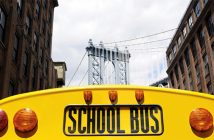 (Photo: Creative Commons)
(Photo: Creative Commons)
According to a recent analysis of federal education data, charter schools are more likely to suspend black students and students with disabilities than their white and non-disabled peers.
Performed by the Center for Civil Rights Remedies at the University of California, Los Angeles, a nonprofit organization for civil rights research and policy, the analysis of charter school data from the Department of Education’s Office for Civil Rights looked at close to 5,000 schools’ data. The results found black students four times as likely to be suspended than their white peers, while students with disabilities were two to three times as likely to be suspended as non-disabled students at charter schools, writes Rebecca Klein for The Huffington Post.
Similar results are seen in traditional public schools, with black and disabled students punished at a higher rate than their peers, for even minor issues. These results can be seen as early as preschool. However, charter schools tend to suspend students at slightly higher rates than traditional schools.
Using data from the 2011-12 school year, the report found that charter schools suspended 7.8% of their students at the elementary, middle, and high school levels, while non-charter schools punished 6.7%. For students with disabilities, charter schools were found to suspend 15.5% of students in comparison with 13.7% of students at non-charter schools. In the most extreme example, 235 charter schools were found to suspend over half of their students with disabilities.
On the elementary level, less than a third of charter schools suspended over 10% of black students, while around 40% of charter schools suspended close to one in four black students at the high school level. In addition, black students were found to be suspended at an even higher rate when enrolled in segregated schools that have a higher proportion of African-American students, writes Motoko Rich for The New York Times.
Of particular concern for advocates of the disabled was the high rate of suspensions for such students at charter schools. They noted that charter schools tend to enroll a smaller portion of disabled students than traditional schools do.
“So these are the children who manage to get in who are being suspended,” said Diane Smith Howard, senior staff lawyer at the National Disability Rights Network.
Education researchers and policy makers said they are concerned about out-of-school suspensions, saying that doing so increases the risk of students dropping out of high school, as well as higher rates of future crime and imprisonment.
Additional research shows that black students are typically suspended for things that white students are not, such as character issues such as defiance or disrespect.
Despite this, charter school advocates maintain that the report should not be considered too strongly when comparing charter schools to traditional schools.
“Parents should have the ability to choose a school that best meets their children’s unique needs,” M. Karega Rausch, vice president for research at the National Association of Charter School Authorizers, a group that represents oversight agencies, said in an email. “For some children, that may be a school with strict rules; for other children, that may be a school that is less strict.”




